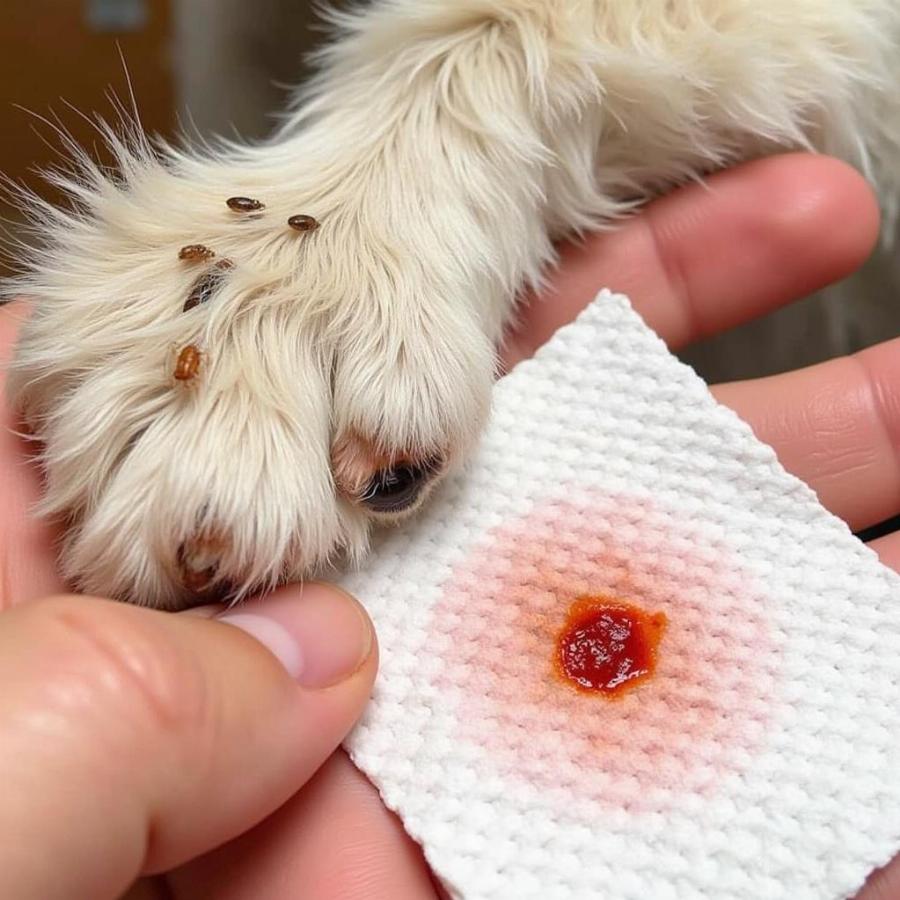Dog man twenty thousand fleas under the sea? While this quirky phrase might conjure images of a superhero canine battling underwater flea infestations, it highlights a genuine concern for dog owners: fleas. This article dives deep into the world of dog fleas, offering practical advice on prevention, treatment, and maintaining a flea-free environment for your beloved canine companion. We’ll explore everything from identifying flea infestations to understanding the lifecycle of these pesky parasites.
Understanding the Dog Flea Lifecycle
Fleas are resilient creatures with a complex lifecycle. Understanding this lifecycle is crucial for effective flea control. The four stages include egg, larva, pupa, and adult. Adult fleas lay eggs on your dog, which then fall off into the environment – your carpet, bedding, or yard. These eggs hatch into larvae, which feed on organic debris. The larvae then develop into pupae, a resistant stage that can lie dormant for months. Finally, the pupae emerge as adult fleas, ready to infest your pet.
Identifying a Flea Infestation on Your Dog
How do you know if your dog has fleas? While the most obvious sign is your dog scratching excessively, you can also look for flea dirt, which resembles small black specks. These are flea droppings. If you wet them on a white paper towel, they’ll leave a reddish-brown stain due to the digested blood.  How to Identify Dog Fleas
How to Identify Dog Fleas
Preventing Flea Infestations: Proactive Measures
Prevention is the best medicine when it comes to fleas. Regular grooming, including bathing and combing with a flea comb, can help remove adult fleas and eggs. Using a preventative flea treatment, recommended by your veterinarian, is essential for year-round protection. Maintaining a clean home environment, including vacuuming regularly and washing bedding in hot water, is also key. dog man book 13
What are the most effective flea preventatives for dogs?
Oral and topical flea medications, prescribed by your vet, are highly effective in preventing and treating flea infestations. These medications work by disrupting the flea life cycle, preventing them from reproducing and ultimately eradicating them from your pet.
Treating Flea Infestations: A Multi-pronged Approach
Treating a flea infestation requires addressing both your dog and the environment. can a dog flea live in human hair Your veterinarian can recommend appropriate flea treatments for your dog, such as topical solutions, oral medications, or flea shampoos. Simultaneously, you’ll need to thoroughly clean your home. This includes vacuuming all areas where your dog spends time, washing bedding and soft furnishings in hot water, and using flea sprays or foggers if necessary. how to stop dog from scratching
How often should I treat my dog and home for fleas?
The frequency of treatment depends on the severity of the infestation and the type of product used. Consult your veterinarian for personalized recommendations.
Natural Remedies for Flea Control
While conventional treatments are often the most effective, some natural remedies can offer supplementary support. These include essential oil-based sprays and diatomaceous earth, a natural powder that dehydrates fleas. However, always consult with your veterinarian before using any natural remedies, as some can be harmful to pets. quick stop dog nails
Are natural flea remedies safe for all dogs?
Not all natural remedies are safe for all dogs, especially puppies or dogs with sensitive skin. Always discuss any natural treatments with your veterinarian before use.
Conclusion: Winning the War Against Fleas
Dealing with dog fleas can be challenging, but with a proactive and informed approach, you can keep your furry friend flea-free. Remember that prevention is key, and regular grooming, preventative treatments, and a clean home environment are essential for winning the war against these pesky parasites. Don’t let “dog man twenty thousand fleas under the sea” be your reality! Take action today to protect your beloved companion.
FAQ
- Can dog fleas infest humans? Yes, although they prefer dogs, dog fleas can bite humans.
- How long can fleas live without a host? Adult fleas can live for several months without a blood meal, especially in a suitable environment.
- Are there over-the-counter flea treatments? Yes, but it’s always best to consult your vet for the most effective and safe option for your dog.
- Can fleas transmit diseases? Yes, fleas can transmit diseases such as tapeworms and Bartonellosis.
- How often should I bathe my dog to prevent fleas? Bathing frequency depends on your dog’s breed and coat type, but generally, once a month is sufficient. However, if your dog has fleas, more frequent bathing with a flea shampoo may be necessary.
- What are the signs of a flea allergy dermatitis? Excessive scratching, hair loss, redness, and scabs are common signs of flea allergy dermatitis.
- How can I prevent fleas in my yard? Regularly mow your lawn, remove debris, and consider using a yard spray designed to kill fleas.
Further Reading
For more information on dog health and care, check out these related articles on our website: dog man 11
Beaut Dogs: Your Ultimate Guide to Canine Companions
Beaut Dogs is your one-stop resource for all things dog-related, offering expert advice, valuable insights, and a passionate community of dog lovers. From breed information to health and training tips, we provide everything you need to ensure a happy and healthy life for your furry friend. When you need expert advice, don’t hesitate to contact us via Email at [email protected] to receive detailed and accurate answers from Beaut Dogs.